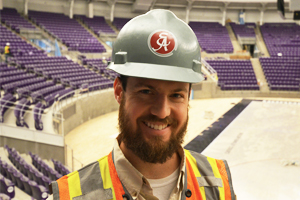AV Excellence: It’s a Family Thing
 When AVIXA launched its Audiovisual Providers of Excellence (APEx) program at the beginning of 2015, Fort Worth, Texas–based Electro Acoustics & Video Inc. (EAVI) was one of the very early adopters.
When AVIXA launched its Audiovisual Providers of Excellence (APEx) program at the beginning of 2015, Fort Worth, Texas–based Electro Acoustics & Video Inc. (EAVI) was one of the very early adopters.
The family-run company, owned by Chris and Sue Jordan, has stood behind the CTS® certification for several years. All of its technicians are required to get their CTS certification, and engineers and project leads are strongly encouraged to take their CTS-I or CTS-D.
Assistant Field Manager Luke Jordan, PMP, CTS-I (Chris and Sue’s son) sees the AVIXA certifications, and especially the APEx seal, as a pathway to winning the top-tier AV jobs in the Lone Star State.
"When we bid on a project and tell the client we’re an APEx company, it really sets us apart," says Jordan. "It's a way to ensure the quality of the installation will be up to standard; that we have proven in the past that we can take a needs assessment and design and build a system that meets those needs and that our clients have agreed that we’ve done that well."
To become an APEx-certified AV provider, in addition to having CTS-certified staff and adhering to AVIXA standards, part of the process is to prove ongoing customer satisfaction. Companies are required to document feedback from their clients — something Electro Acoustics' customers have been more than happy to provide in the form of good reviews, according to Jordan. He has also noticed that as the certification has become more recognized, customers have started to include it as a requirement. "It's common to see a requirement that the lead installer be CTS-I or the designer/engineer be CTS-D certified. But we've been on projects where there has been a requirement to be an APEx company, as well," he says. "We really encourage our clients to only work with APEx-certified companies, because of what it shows: that we've proven the ability to meet their needs and install quality systems that work and are serviced well."
Electro Acoustics has developed an internal checklist as an iPad app, which is based on the AVIXA Standard Guide for Audiovisual Systems Design and Coordination Processes (2M-2010) and AV System Performance Verification Standard (10:2013) — both requirements for the APEx certification. Typically, explains Jordan, the project lead will verify that the project has been completed to the standards and then the system designer will do a recheck. "We only have to do one APEx project a year to maintain our certification. But we still use it for internal checks on most of our projects, as it lets us know we’re doing a good job and it helps solve issues," he says.
Would he recommend the APEx program to other AV companies?
"Absolutely. It's an investment toward their future and well-being. I think as the technology advances and competition increases, it protects the client to work with APEx companies. We feel like it's an investment to have the certifications and processes to maintain the quality. It's time consuming and you have to pay to keep the certification in place, but we’re willing to put in that investment so that our company is strong and serves our community. The effort put in has definitely paid off," he says.
Electro Acoustics Turning Points
In 32 years, Electro Acoustics has gone from a two-person operation run out of the Jordans' garage, designing and installing audio systems for homes and churches, to its current status as one of Texas' leading AV systems integrators.
"The big turning point for the company was when we did the sound system for the Texas Rangers ballpark," says Luke Jordan, Electro Acoustics' Assistant Field Manager and the son of company founders Chris and Sue Jordan. "Once we'd done the sound system for a major league team, that put us in a whole different league."
Now with a team of 25+ employees, the company provides the full range of AV services to a wide variety of mid- and large-scale projects. One notable project was Fort Worth's Sundance Square Plaza, a multiuse outdoor entertainment venue and public gathering space that helped earn Fort Worth its #1 spot in Livability.com’s list of best downtowns shortly after its opening in fall 2013.
More recently, the company put the finishing touches on the massive renovation of Texas Christian University's Daniel-Meyer Coliseum basketball arena, a $72-million update of the 53-year-old facility. The arena, completed in December 2015 and renamed the Ed and Rae Schollmaier Arena, required an onsite crew of 10 who logged in excess of 6,000 man-hours over the course of a year. Improvements inside the arena included a state-of-the-art front-of-house mix location, additional Electro Voice cabinets to boost audio in the expanded arena, and a massive digital signage upgrade. "We also installed a 3 x 3 video wall in the Courtside Club with a Black Diamond video processor, which allows TCU to combine all screens or use multiple combinations of sources to display at once in multiple configurations," explains Jordan. "To round it off, the athletic offices in the facility have a distributed RF system, providing content to displays in each office and lobby."
The size and scope of the TCU project made it one of the company's biggest undertakings to date.
Learn More
Explore How to Participate in AVIXA's APEx ProgramHow Can Standards Help Your Business?
We know that you want to know more about how standards can boost your business. Standards help you access new markets and increase your competitive advantage.Learn More About Standards





